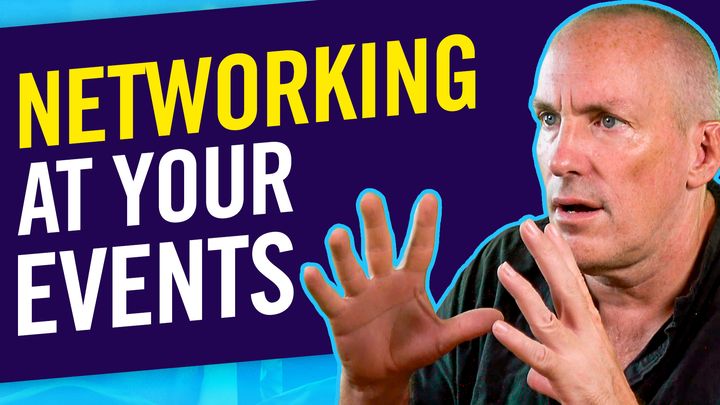7 Tactics You Can Use To Find Speakers For Your Virtual Summit

Finding speakers for your virtual summit is not as easy as some experts would like you to think it is. Not to mention finding the right speakers who will captivate and wow your audience.
Does your event have the right speakers? Are you using the right tactics to find and attract speakers? Does your event create enough value for your speakers?
Finding presenters for your virtual summit is easier if you know where to look, so let’s immediately dive into the 7 tactics you can use to attract great speakers!
First, let’s start by considering what a great speaker looks like?
- The best presenters can offer insight, perspective, and thoughtfulness.
- They create energy in the crowd.
- A well-known player in the field may be available, but can they create an experience for your attendees?
- Are their ideas worth sharing?
- The best speakers will have real life examples of failures and successes that the audience will be able to relate to.
- You can gain more attention and membership for your association depending on how your speaker performs so keep these questions in mind!
- The best speakers know their value. They know their audiences want to see them. They know their presence brings people to the event. The best speakers customize their presentations depending on the time they’re allotted, the type of event, and the makeup of the crowd.
- Those are the people you want!
Now, to find these unicorns, use the following practical strategies:
Before I dive into the steps for finding your perfect speakers I want to let you know about a free resource we’ve created to help you make a bigger impact in your business while becoming completely cancel-proof.
Now, let’s go find some speakers for your summit.
1. Start with people you already know
- This one seems obvious but start by looking more closely at the people you already know. If you made your preliminary list off the top of your head, take a look through:
- Past emails
- Collaborations
- Who you're following on social media.
- If you run into someone who you know will have great value to add, add them to your list.
2. Call for proposals
Note, if you’re working on your first summit, this approach might not get a lot of traction. However, once you have a couple successful summits under you’re belt, you’re going to find speakers who are not only qualified, but they are engaged.
- Offer potential candidates the opportunity to submit their ideas with a call for proposals or abstracts.
- This can give you a large pool of speakers to choose from.
- But if you want quality candidates, you’ll need a solid promotion plan to attract pitches, along with the resources to weed through the submissions.
- Post on your social media channels a quick blurb about RFPs (requests for proposals)
- Include the information that is most important for potential speakers to submit.
- This can be something as simple as their sample presentation title or as detailed as their entire slide deck.
- Your followers are a great pool of potential candidates for adding value to your event.
- Don’t forget to use email marketing as well.
- Use your list to connect with everyone that you have a relationship with.
- Go through your proposals with care
- Combing through the proposals and abstracts is easier when you take time to ensure the speakers are knowledgeable in the topic or industry.
- Your goal is to find the best conference speaker to convey your message, add a unique perspective, or provide expertise.
- With your shortlist of possible conference speakers, start holding brief interviews.
- You want to ensure your speakers get your message across to your audience. Ask questions about their knowledge and experience in the field.
- Even if you’ve already got a reputable, big-name keynote speaker locked down, using an open call is a good way to fill your roster with other fresh, up-and-coming speakers who won’t cost an arm and a leg.
3. Dive into social media!
- Social networks like YouTube, LinkedIn, and SlideShare are goldmines for professional speakers.
- On YouTube, for example, search for topics relevant to your conference to see who’s talking about them.
- Then narrow your search by filtering by the number of views to help identify the most popular content.
- You can also mine social media insights to identify speaking candidates. Facebook Audience Insights, for example, allows you to build a profile of your audience and see who they follow on their social networks. The results can help you find your ideal speaker.
4. Look at who others are following
- Next, take a look at the social media accounts of people in your target audience as well as industry experts.
- Social media can help you find speakers and decide whether their speaking style suits your event.
- If you have a speaker in mind, you may be able to find videos of prior speeches on YouTube. You can also check out TED Talk videos on YouTube and discover new speakers through this method.
- Other social media like LinkedIn can also help in the search, providing information on their prior experience and work history.
- These resources can provide insight into a speaker’s expertise in a topic and into their performance.
- Once you find a speaker you’re interested in, you can follow up with a more thorough search on the internet.
- Check out their other platforms and reviews to see if they’re reliable and really up to par.
5. Ask your audience for their suggestions!
- Next, ask your audience who they'd like to learn from!
- Use Facebook or Twitter, or, if you have an engaged email list, surveying your list is another great option.
- Designing these forms can be easily made with websites such as Typeform and Survey Monkey.
- Ask your audience who they love to learn from and what topics related to your summit they would love to learn about.
- You'll likely get some amazing suggestions that you would have missed on your own.
6. Who’s already influential in your field?
- Experience and expertise can be great things to use to find a great speaker, but influence can be another quality to base speaker selection on.
- Find those who attended your events and are very active and influential on social media, these people can often be great speakers.
- Try approaching them, they might be too shy to put themselves forward but clearly love your event and would like to share their experience with your audience.
- Start grooming those enthusiasts to become speakers themselves one day.
- Find out about their specialties. Do they have anything interesting to say? Are they capable of speaking in front of the group, or would they be better leading a smaller session?
- Finding someone who is passionate about the topic will often have the potential to attract more attendees to your event.
- Plant the idea of speaking in their heads long before they actually have to get on stage.
- Keep them in a special email list to reach out to when you need to fill a time slot or when their experience/knowledge would be useful to you.
7. Use a Search Engine
- If the previous methods haven't filled your speaker list, use Google and Pinterest to search.
- For the best results, search for specific topics you'd like to have covered in your summit.
- If in your search, you see someone who has been interviewed on podcasts or written guest posts about the topic you're searching for, you know they're a great person to reach out to as they're open to collaborations.
Finding your summit speakers is only the first or second step of creating a killer summit, but it is an important one.
Once the speakers are lined up, you next have to work on getting the best content possible for your audience. This likely means interviewing your speaker, getting their biographies, headshots and more.
We discuss these topics and many others on our channel, so subscribe right now.
And don’t miss our weekly livestream focusing specifically on freedom of speech and creating a business that is completely cancel proof.




